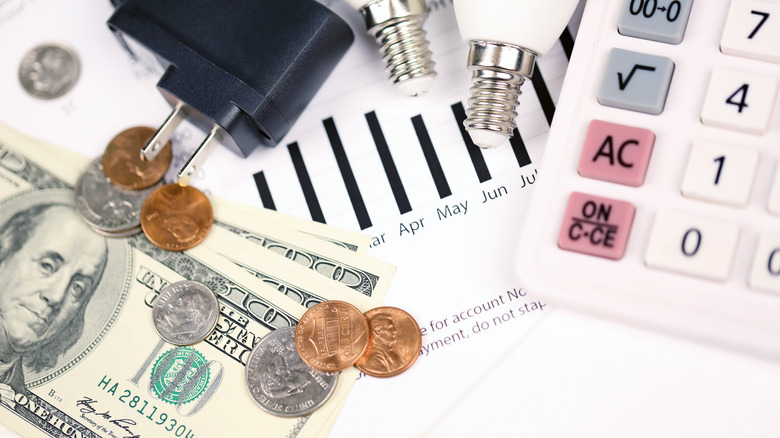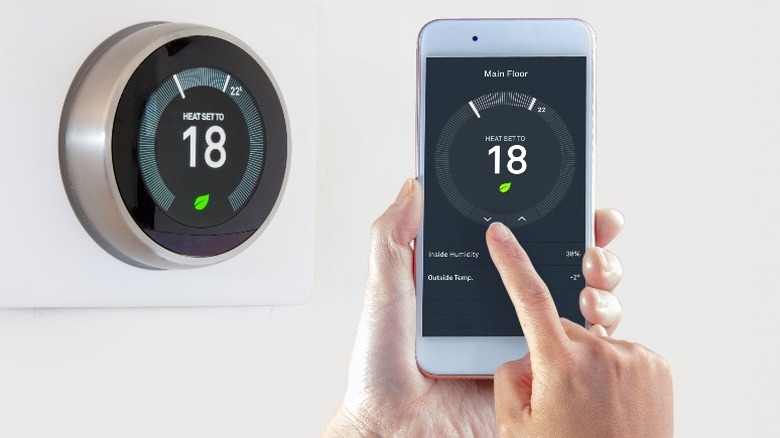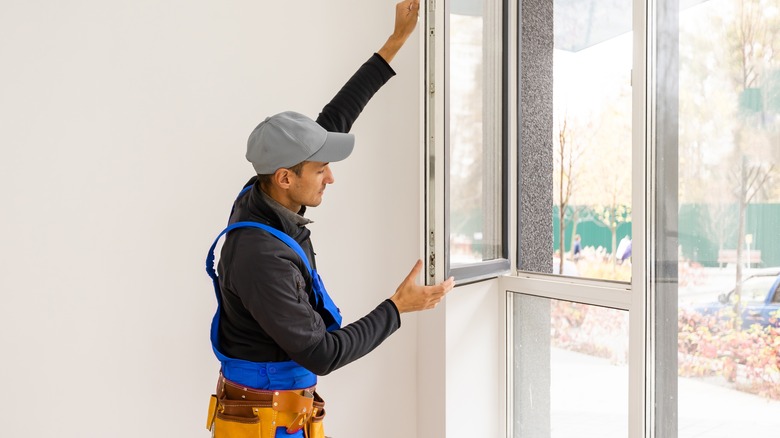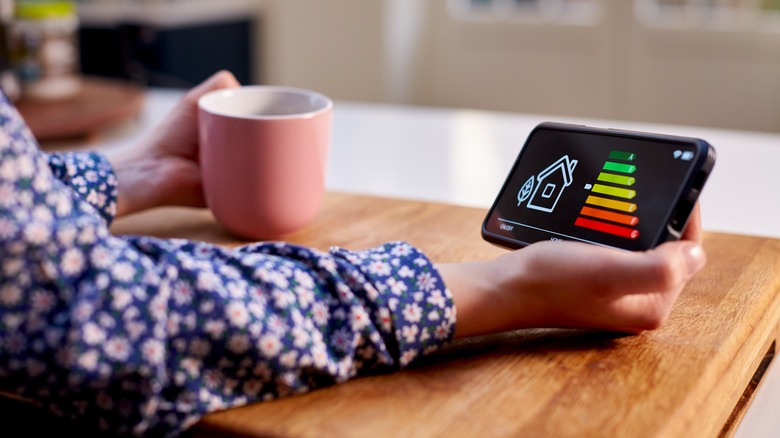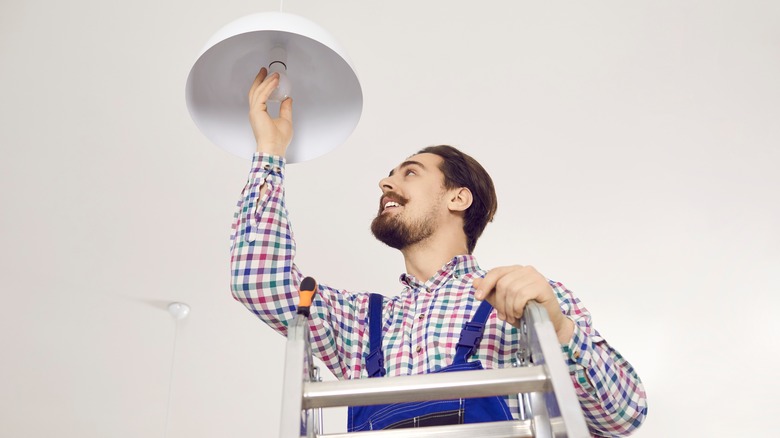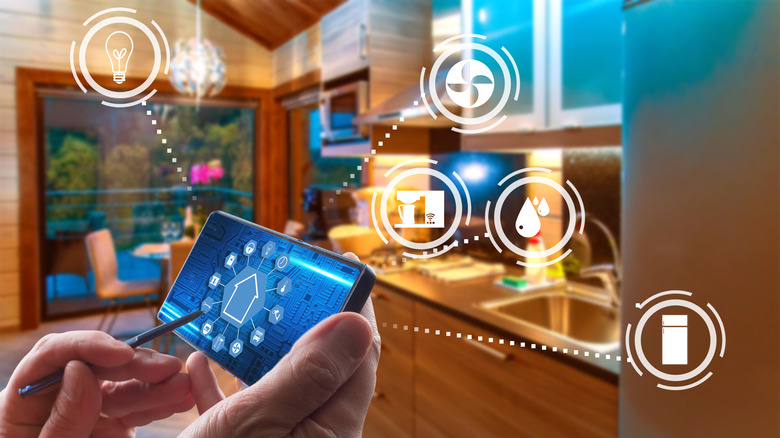5 Ways To Help Reduce Your Energy Costs At Home
If you've noticed a significant increase in your home's energy bills, you should be concerned because of two reasons. First, it means more money out of your pocket, and if the Energy Information Administration's forecast is correct, those energy costs will continue to go up. A second concern is how energy use impacts the environment. According to EnergySage, homes contributed up to 19% of the global carbon footprint in 2016. The good news, though, is that saving energy from home goes a long way in reducing overall global carbon emissions.
To reduce energy costs for your home, you basically need to do one of two things: find a way of reducing your energy expenditure and/or get an alternative source of energy that's cheaper. Fortunately, there's plenty you can do right from your home to help reduce that considerable gas and electricity bill. You don't necessarily need to make dramatic changes to your lifestyle, rather simple solutions will help you reduce how much you pay monthly or annually. Since October is energy awareness month, take a look at the following ideas and quick fixes that should help you get started.
1. Consider using a smart thermostat
Energy consumption is usually dependent on two factors, the amount of electricity the appliance needs to run and also how long it needs to stay on. With these two factors in mind, your home's HVAC system sits right at the top of energy consumers. In fact, according to Perch Energy, the HVAC system is responsible for up to 50% of all energy consumption of a home. It draws a lot of electricity and can also run for extended durations of time. The thermostat can be referred to as the brain of the HVAC system, controlling its operation. Investing in a programmable thermostat gives you the luxury of deciding when to heat or cool your home.
In fact, smart options can learn your cooling and heating needs and adjust accordingly. This goes a long way in reducing the amount of energy expended heating your home when, for example, you're away. Depending on the model, you can also have additional functions that allow you to control the operation of the HVAC system remotely. You no longer have to worry about forgetting to switch off the HVAC system before going to work. What's more, the thermostat can even indicate when the HVAC system is broken and needs repair, which can also help you save in the long run.
2. Turn your windows into energy-efficient ones
You'll be surprised just how much energy is lost through the windows. According to the Department of Energy, the heat that escapes or is gained from the windows accounts for up to 30% of the total energy needed to cool and heat buildings. The only way of stopping heat loss or gain through the windows is by installing energy-efficient windows. When it comes to such windows, there's no one-solution-for-all mentality. Your environment should determine the type of window that's ideal for your home.
Installing gas-filled windows with low-E for colder regions should help you significantly reduce heat loss through the windows. However, if you don't know the right type of energy-efficient windows for you, begin by finding your Energy star climate; then look for windows with a certified ENERGY STAR label ideal for that climate. Certified ENERGY STAR-rated windows can save you up to 12% on heating and cooling costs in your home. Adding secondary insulation on your windows (for example, an awning or shades) will help you conserve even more energy.
3. Change your energy-consumption habits
Sometimes reducing energy bills at home doesn't need to be all about installing smart devices or finding the latest appliance that promises zero energy consumption. If you honestly assess your daily habits, you'll quickly notice that there are some things you can do better as far as energy conservation is concerned. One of those minor things that most homeowners are guilty of is leaving appliances running when not in use. HowStuffWorks mentions that leaving appliances on standby when not in use can account for up to 5% to 10% of your energy bills.
The simple mindless act of turning appliances off before going to bed can prevent you from losing up to $100 every year while you're asleep. Another hack that will also save you a lot of money on energy bills is not over-relying on the heating and cooling system. During winter, you can reduce the use of the heating system by making sure your doors and windows are sealed completely when shut. Be sure to also regulate the use of your air conditioner during the summer months. Remember heating and cooling are solely responsible for up to 50% of a home's energy costs.
4. Swap your lightbulbs
Another quick solution you can implement in your home to salvage the energy cost problem is swapping your traditional bulbs for energy-saving options. Think about it, you'll be getting the exact same amount of light for a relatively cheaper energy cost, which seems like a pretty good deal. According to the Department of Energy, lighting is another major consumer of electricity, accounting for 15% of the total electricity cost in most households. Before picking just any other bulb from the shelf, be sure to check if it has the ENERGY STAR label, which indicates that it has met all requirements set by the Environmental Protection Agency.
Among the most common energy-saving bulbs you can find include LEDs, compact fluorescent lamps (CFLs), and halogen incandescent. There is no doubt that these bulbs will be costly at checkout; however, think about the amount of money you'll save on energy costs down the line. To give you some perspective, you can save up to $225 on energy bills if you switch to LED bulbs. It's also worth noting that energy-saving light options last longer than their traditional counterparts, which is also how they end up saving you money in the end.
5. Invest in new appliances
Home appliances also contribute a significant amount to energy costs every month, and switching to energy-efficient home appliances will save you a good deal on your electricity bills overall. According to EnergySage, certified ENERGY-STAR-rated home appliances use between 10% to 50% less electricity than their regular counterparts. With the ever-increasing energy rates, making the switch to energy-efficient appliances is among the best investments you can make if you want to reduce your home's energy bills.
It's worth mentioning that appliances have different energy-saving abilities. For instance, an energy-saving refrigerator will only save up to 9% of electricity consumption while a rated energy-saving washing machine uses up to 25% less energy. While the initial cost of purchasing such appliances can be high, consider the fact that you'll save on electricity bills for 10 years or more, which is the average lifespan for most home appliances.
